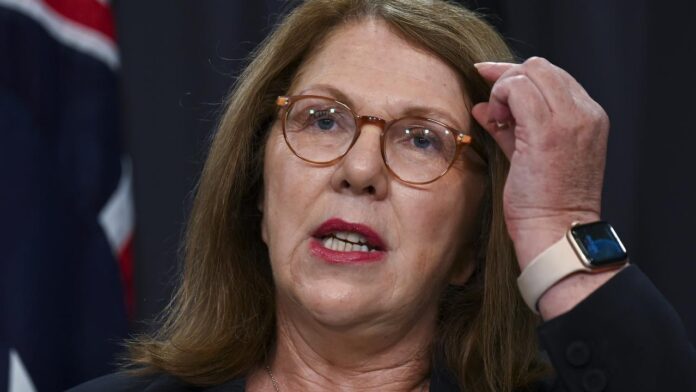[ad_1]
A promise by the Albanese government to unveil mandatory pollution caps for new vehicles sold in Australia by the end of 2023 has been broken, sparking fears its landmark EV policy will be put on ice.
In April, Labor committed to introducing a new fuel efficiency standard, with a favoured model to be unveiled “before the end of this year”.
Under the standard, automotive brands will be penalised when they sell cars with high-polluting internal combustion engines in an effort to spur the uptake of electric and other low-emissions vehicles.
Aside from Russia, Australia is the only developed nation without fuel efficiency standards.
As a result, passenger vehicles can emit as much as 50 per cent more carbon dioxide than in similar overseas markets, as less efficient cars are still imported to Australia.
At the same time, just eight per cent of new cars sold in Australia in the last 12 months were electric vehicles, while this figure was almost 17 per cent in Europe.
But despite assurances of long-awaited fuel efficiency standards by year’s end, Transport Minister Catherine King is still yet to unveil the proposed legislation.
In September, modelling work undertaken by ACIL Allen for the proposed standard which was due to be completed in August was extended through to January 30 2024.
Weighing on the proposal are fears that against a backdrop of the rising cost of living, the standards — which could potentially limit the number of cars available to consumers or increase the cost for some high-polluting models — could open the government up to Coalition scare campaign in the lead up to the next election, industry sources said.
Others said Ms King had been consumed by other matters across her portfolios including her controversial decision to block Qatar Airways’ bid to increase flight capacity and the independent review of Australia’s $120 billion infrastructure pipeline.
In a statement, a spokesman for Transport Minister Catherine King would not provide a timeline for when the proposed standards could be released.
“Designing the best possible fuel efficiency standard (FES) to suit Australia’s circumstance is complex, and the Australian Government is committed to taking the time to get it right,” the spokesman said.
But with Australians heading back to the polls by May 2025 at the latest, advocates for a more ambitious standard feared the policy could be shelved in its entirety.
Independent member for North Sydney, Kylea Tink, who has spearheaded calls for stringent fuel efficiency standards in federal parliament, said the Albanese government had demonstrably failed to meet its commitment.
“It’s definitely a pretty clear case of a broken promise,” Ms Tink said.
“It’s worse than frustrating that we’re going to end 2023 without fuel efficiency standards … there is no line of sight on them.”
Citing the failed commitment by two previous Labor governments to introduce a similar efficiency standard, Ms Tink said it was imperative that the government was held to account on its promise.
“Up until now, at least the government’s been prepared to say: ‘Yes, they’re definitely coming and here’s the timeline’,” Ms Tink added.
“Now there’s no timeline — that really concerns me.”
The Climate Council’s head of advocacy, Dr Jennifer Rayner, agreed that it was critical that the government delivered on its commitment, ensuring access to cleaner and cheaper-to-run cars.
“Every day we delay putting a fuel efficiency standard in place, Aussies are missing out on the three-in-one benefits of cheaper costs, cleaner air, and greater choice,” Ms Rayner said.
However, car dealers and their industry association representatives have urged the government to take a more cautious approach to the new standards, citing the need the for strong community support for the change.
Tony Weber, chief executive of the Federal Chamber of Automotive Industries, said despite the delay, it was paramount that time was taken to ensure the standard reflected the demands of the Australian car market.
“It’s absolutely critical that the government takes time and gets this right. That’s critical for environmental outcomes and for consumers,” Mr Weber said.
“There’s no point in going for what others are calling for – a stringent target – which means essentially in the very near future, the only cars that will be able to be sold will be complete electric vehicles.
“There are so many segments of the market that there is not an electric vehicle capability among mainstream brands – and that’s before we talk about price.”
Mr Weber also pointed to the need for a scale-up in supporting infrastructure to drive the uptake of the low-emission vehicles.
“We need to have the product supported in the marketplace … rather than people who just purely talk about a target.”
[ad_2]
Source link


